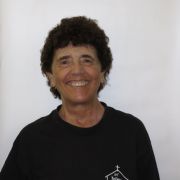"… imagine what a gift it would be to start all over again."
—Margaret Renkl, Late Migrations: A Natural History of Love And Loss
I sometimes imagine what it would be like to start my religious life all over again. As it happened, I walked through the huge basilica-like door with my excited, 18-year-old self totally unaware of what was coming. And totally unaware that my mother was weeping behind me. If I could start all over again, I'd enter hand in hand with my mother and father.
I sometimes imagine what it would be like to spend more time on the chapel pews and less time crawling under them to nudge imaginary dirt out of the screws. What it would be like to see our nervous director with merciful eyes, the inheritor of absurd ideas, like confessing personal faults that didn't exist, totally unaware there were more serious ones lurking behind.
I sometimes wish my young teaching self had brought my eighth-grade students outside on the bleachers more often, there to read the Greek tragedies, to proclaim loud and clear, "I will obey God, not men."
Had I known the reverend principal was watching from his office window, I would have taken the students out rain or shine, since the fearful principal was going to fire me anyway. Might just as well do more tragedies and toss in a few comedies, as well.
Through it all, I kept my peace. In a few years, he left the windows, the school, the priesthood, and got married.
Meanwhile, I was shipped off to the "worst school" our community staffed. As it happened, the school was in the poorest section of my own hometown. Needless to say, my mother was delighted to have me nearby.
The God of mercy prevailed. I taught the same Greek tragedies, comedies and Shakespeare, this time to 35 seniors. We created a yearbook, a literary magazine, and made heaven out of a school in its last days. Our sister-principal was delighted. "If you can pay for it, you can do it."
Advertisement
Advertisement
Despite the odds, 13 of our students won full college scholarships. One of them also won Scholastic's first prize and $100 for her original short story. When I presented her with the prize, the whole class stood and clapped. Later that afternoon, I discovered a small bouquet of dandelions on my desk.
Today, the school is long gone, the area abandoned, and a devastating war rages in Ukraine. Across town, 200 of us are packed in St. John the Baptist Ukrainian Church, begging for God's mercy.
Even as we pray, the Russian army shows no mercy, destroying one town after another. Millions of women and children have crossed the border with little but the clothes they wear. Back in Ukraine, old women who would not leave are making Molotov cocktails to hurl at advancing tanks.
To what effect this David and Goliath? To what effect the fervent prayers we hurl heavenward here in a church 2 miles from my home on the other side of the globe?
Downstairs, coffee and pastries wait for the churchgoers, and stories, so many stories of relatives rescued from Ukraine and relatives still in hiding there.
Lesia N. connects online with her cousins in Lviv and Ternopil. She does not name them because "you never know who is listening."
Proudly, she describes the one who threw a can of tomatoes at a small Russian drone and knocked it out.
Ryan D. and his wife flew to Poland, then on to Dnipro, Ukraine, there to bury her father in the land he loved. They left with his wife and a bag with mostly family pictures. They were among the last to board the train to Poland.
"We stick together," he says, as he refills the coffee urn in the basement of a Ukrainian church in upstate New York.
"We stick together," proclaimed down in the church basement. Another variation of what we heard upstairs in the pews, "Love one another as I have loved you."
I salute the coffee man with my drink and say, "Thank you."
On my way out, I think, "What a gift it would be to start all over again." In God's merciful presence, what would a forward glance look like, for each of us, and all together?
Like what you're reading? Sign up for GSR e-newsletters!



